|
|
|
Sort Order |
|
|
|
Items / Page
|
|
|
|
|
|
|
| Srl | Item |
| 1 |
ID:
123172
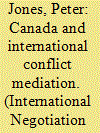

|
|
|
|
|
| Publication |
2013.
|
| Summary/Abstract |
Abstract This article explores the attitudes of Canadian officials towards international conflict mediation and towards the potential for greater official Canadian involvement in the field. The study is based on extensive interviews with Canadian officials who have been involved in mediation at various points over a 20-year period. It finds that Canada, and particularly the Department of Foreign Affairs and International Trade (DFAIT), has taken a largely ad hoc approach to its involvement in the field. Prior to the initiation of this study, there had been no attempt to develop an institutional capacity in this field within DFAIT or to keep track of the personnel involved in such experiences, much less to develop a trained cadre of such individuals. This stands in contrast to the efforts of countries that have prioritized mediation as a foreign policy activity, such as some Scandinavian countries and Switzerland. Many of those interviewed pointed to these countries as potential models for Canada in this field, but it became apparent in discussions that most of those interviewees were not necessarily well-informed as to what these countries have done; there was just a general sense that these countries do it well and that Canada could learn from them. Moreover, none of the interviewees demonstrated significant familiarity with the vast literature on mediation. Those interviewed made recommendations as to how Canada might develop its official mediation capacities so as to play a more active and focused role in this field.
|
|
|
|
|
|
|
|
|
|
|
|
|
|
|
|
| 2 |
ID:
123171
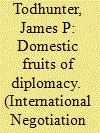

|
|
|
|
|
| Publication |
2013.
|
| Summary/Abstract |
Abstract The notion that national leaders use foreign policy actions for domestic political benefit is widely accepted in the foreign policy literature, but has only been studied with regard to foreign policy involving the use of force. Literature on third-party mediation has emerged separately and has not taken mediators' domestic political motivations and constraints into account when explaining mediation occurrence and outcomes. Diplomatic efforts such as mediation should be appealing to leaders seeking to impress their domestic audience because it provides them with a low risk opportunity to appear competent to their domestic audience. While mediation is a regular occurrence in US foreign policy, its public visibility varies greatly. However, models of presidential media coverage suggest that media outlets are likely to pay a disproportionate amount of attention to presidents and their high level surrogates while engaging in diplomacy overseas. The article proposes that the higher the profile of the official an administration sends to mediate a crisis overseas, the greater the increase in the president's approval rating. Additionally, the public's attentiveness to foreign policy should condition the effect of a high profile mediator on presidential approval. As foreign policy becomes more salient to the public, the effect of a higher profile mediator on presidential approval should be greater. Empirical results support the argument.
|
|
|
|
|
|
|
|
|
|
|
|
|
|
|
|
| 3 |
ID:
123175


|
|
|
|
|
| Publication |
2013.
|
| Summary/Abstract |
Abstract This article tests the assertion that narratives constructed around international environmental issues serve to promote or reduce opportunities for their resolution. It does this by interpreting the influence of Lebanese and Israeli environmental narratives on resolution of and indirect negotiations over the Upper Jordan River conflict. Colonial archives, key informant interviews and academic and policy literature serve to identify and critically investigate the narratives. An official Lebanese narrative of adherence to international law is found to contradict the more popular nationalist narrative of Israeli 'theft' of the flows. An Israeli water security discourse is found to be built on earlier narratives that have long held water (and the Upper Jordan flows in particular) as both a physically scarce and strategic commodity necessary for continued existence of the Israeli state. Basic discourse, security studies and negotiation theory is developed to gauge the influence of the narratives during the 2002 informal negotiations over the Wazzani pumping station dispute. The more influential Israeli discourse is found to establish the starting point (no discussion on re-allocation of the flows) and process of the informal negotiations. The narratives are found to open or shut windows for resolution of the conflict, by politicizing or securitizing ideas about the flows, respectively. The conflict management approach favored by US and EU mediators is seen to align with the more dominant discourse, at the cost of enduring asymmetry and tensions, and missed opportunities for both resolution of the conflict and promotion of fair water-sharing norms.
|
|
|
|
|
|
|
|
|
|
|
|
|
|
|
|
| 4 |
ID:
123170
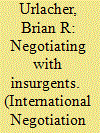

|
|
|
|
|
| Publication |
2013.
|
| Summary/Abstract |
Abstract High costs have long been seen as motivating conflict participants to seek peace. This article discusses two types of deviations from the "hurting-stalemate" logic: negotiations in the absence of high costs and non-negotiation in the face of high costs. Two prominent explanations for these deviations are discussed and evaluated, initially through a statistical analysis of peace overtures in intrastate conflicts and then through a case study of the Indian civil war in Kashmir. The results suggest that theoretical explanations focusing on the preferences and political strength of leaders have traction at all levels of violence. Variables associated with shifts in perception, such as leadership change or political shocks, seem to have different effects as the level of violence in a conflict changes.
|
|
|
|
|
|
|
|
|
|
|
|
|
|
|
|
| 5 |
ID:
123173
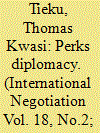

|
|
|
|
|
| Publication |
2013.
|
| Summary/Abstract |
Abstract This article examines impacts of luxurious perks, such as paid daily allowances on peace talks. It draws on the case of the Burundian peace processes held in Arusha, Tanzania and the Seventh Round of the Inter-Sudanese Peace Talks held in Abuja, Nigeria to show that perks can unintentionally prolong peace talks. Perks bestowed on delegates to the talks seduced the conflicting parties away from whatever interest they might have had in actually reaching an agreement. For some, living free of charge in five-star hotels and receiving the equivalent of five months' pay in one week of per diems made continued talks more attractive than achieving peace. Many of the feuding parties found the perks of greater value for their effort - or rather, lack thereof - and they shared an incentive to keep the talks going.
|
|
|
|
|
|
|
|
|
|
|
|
|
|
|
|
| 6 |
ID:
123174
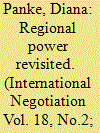

|
|
|
|
|
| Publication |
2013.
|
| Summary/Abstract |
Abstract The United Nations General Assembly is the International Organization (IO) with the broadest worldwide membership. While regional organizations are not members themselves, they can and often do become active through their own member states. This article addresses two questions: Do regional organizations differ in their ability to speak with one voice in IOs and, if so, why? Are some regional organizations more successful than others and, if so, why? Based on liberal theory and a mixed-methods approach, the research suggests, firstly, that regional organizations are in a better position to engage in collective action in IOs if they can develop group positions for a broad range of items. This is easier the greater the capacities and the stronger the incentives of the member states, the smaller the number of actors participating in regional organizations' coordination meetings, and the more homogenous groups are. Secondly, regional organizations are especially successful in IOs if they have common positions that their experienced and knowledgeable member states can push via argumentative strategies and if regional organizations can rely on the larger membership when it comes to playing two-level games in UNGA negotiations (tied-hands strategy) and when it comes to voting in IOs.
|
|
|
|
|
|
|
|
|
|
|
|
|
|
|
|
|
|
|
|
|